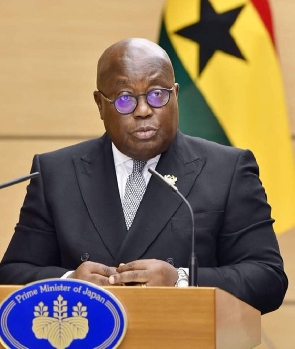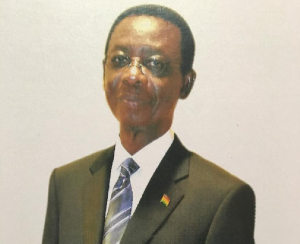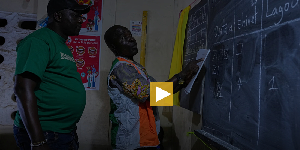Hours after his much-awaited address to the nation on the economy, President Nana Addo Dankwa Akufo-Addo is topped trends on social media platforms, particularly Twitter. Most users of the micro-blogging app have taken a swipe at the president over what they say was his lack of concrete steps to alleviate the plight of Ghanaians bearing the brunt of economic hardship and also his failure to use the address to dismiss some of his appointees. Others have also been comparing former President John Dramani Mahama’s October 27 address on the economy to Akufo-Addo’s. Persons who are making the comparison believe former President Mahama’s address was much better than President Akufo-Addo’s who regurgitated past comments on the economy. Akufo-Addo in his address admitted that the country was in crisis while rallying support for various government interventions to stem the tide. “We are in a crisis, I do not exaggerate when I say so. I cannot find an example in history when so many malevolent forces have come together at the same time. “But, as we have shown in other circumstances, we shall turn this crisis into an opportunity to resolve not just the short-term, urgent problems, but the long-term structural problems that have bedeviled our economy,” he said. But like before, President Akufo-Addo blamed the Covid-19 pandemic and the ongoing Russia-Ukraine war as causative factors for the economic woes. He also outlined measures adopted by the cabinet after its 3-day retreat to discuss measures relating to the economy. The measures include the following: 1) enhanced supervisory action by the Bank of Ghana in the forex bureau markets and the black market to flush out illegal operators, as well as ensuring that those permitted to operate legally abide by the market rules. Already some forex bureaus have had their licenses revoked, and this exercise will continue until complete order is restored in the sector; 2) Fresh inflows of dollars are providing liquidity to the foreign exchange market, and addressing the pipeline demand; 3) the Bank of Ghana has given its full commitment to the commercial banks to provide liquidity to ensure the wheels of the economy continue to run in a stabilized manner, till the IMF Programme kicks in and the financing assurances expected from other partners also come in; 4) Government is working with the Bank of Ghana and the oil producing and mining companies to introduce a new legal and regulatory framework to ensure that all foreign exchange earned from operations in Ghana are, initially, paid to banks domiciled in Ghana to help boost the domestic foreign exchange market; and 5) the Bank of Ghana will enhance its gold purchase programme.
You listen to Mahama speak on the economy and you listen to Nana Addo speak on the economy and you wonder who the real President is.— Albert Nat Hyde (@BongoIdeas) October 30, 2022
A question to both JM and Addo D Ghanaians: What are you going to do about the cedi depreciation? John Mahama: Let's consume more of our local foods. Nana Addo: Sika mp3 dede. pic.twitter.com/jXN0LurGDK— INg. Cummings (@DollyCFC) October 30, 2022
@NAkufoAddo says “Sika mp3 dede” so you people should relax, cos if you make noise, the IMF money on its way won't come again???????? #nanaaddo #FellowGhanaians pic.twitter.com/BGPuXxNGxz— @Mr Omensah (@Omensah_Henry) October 30, 2022
So Nana Addo didn't fire anyone in the speech? How do you want us to have confidence in the same group that put us in this mess?— Samuel Sesah???????? (@Dr_Sesah) October 30, 2022
Nana Addo's mistake was allowing John Mahama to address the nation before he did, the bar was set too high for him.— ????????????????Hon_Nii???? (@eniimartey) October 30, 2022
Nana Addo said Ghanaians are not paying their taxes well that’s why Ghana is in this economic crisis. Eiiiiii— Dr King Winter (@I_Am_Winter) October 30, 2022
Everything Nana Addo said in his address is a lie, an insult to the intelligence of Ghanaians and a gross display of arrogance & incompetence. He took responsibility for nothing and only wanted to come across as that guy who’s on top of issues. He’s living in a fool’s paradise.— Albert Nat Hyde (@BongoIdeas) October 30, 2022
Fellow Ghanaians John Mahama sometimes makes you feel Akufo Addo is an illiterate without vision ???????????????? …. Nana Akuffo Addo is so empty gosshhhhhh #HopeForGhanaEconomy #FellowGhanaians pic.twitter.com/hWu3opofVk— Paa Kwesi (@papakwesi_jr) October 30, 2022
No disrespect intended but Nana Addo didnt say anything. Walaahi— TWO TERTY (@Aboa_Banku1) October 30, 2022
Nana Addo is a curse to Ghana. Way3 ne spes s3 swedru Chapel Square.— JM (@fanti_boy) October 30, 2022 You can also watch this episode of People & Places on GhanaWeb TV:
General News of Monday, 31 October 2022
Source: www.ghanaweb.com













